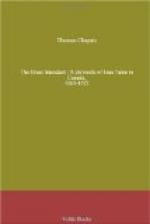Moreover the prohibition of the brandy traffic was not as detrimental to the material development of the colony as was contended. It was possible to trade with the Outaouais, the Algonquins, the Iroquois, without the allurement of brandy. The Indians themselves acknowledged that strong liquor ruined them. The Abbe Dollier de Casson, superior of the Montreal Sulpicians, was perfectly right when he made the following statement:
We should have had all the Iroquois, if they had not seen that there is as much disorder here as in their country, and that we are even worse than the heretics. The Indian drunkard does not resist the drinking craze when brandy is at hand. But afterwards, when he sees himself naked and disarmed, his nose gnawed, his body maimed and bruised, he becomes mad with rage against those who caused him to fall into such a state.
Some years later the governor Denonville answered those who enlarged on the danger of throwing the Indians on the friendship of the Dutch and English if they were refused brandy. ‘Those who maintain,’ he said, ’that if we refuse liquor to the Indians they will go to the English, are not trustworthy, for the Indians are not anxious to drink when they do not see the liquor; and the most sensible of them wish that brandy had never existed, because they ruin themselves in giving away their furs and even their clothes for drink: Denonville’s opinion was the more justified in that at one time the New England authorities proposed to the French a joint prohibition of the sale of brandy to Indians, and actually passed an ordinance to that effect.
There were many other articles besides brandy that were needed by the Indians, and for which they were obliged to exchange their furs. But even had the prohibition caused a decrease in the fur trade, would the evil have been so great? Fewer colonists would have been diverted from agriculture. As it was, the exodus from the settlements of bushrangers in search of furs was a source of weakness, and the flower of Canadian youth disappeared every year in the wilderness. Had this drain of national vitality been avoided, the settlement of Canada would have been more rapid. Even from the material point of view it can be maintained that the opponents of the brandy traffic understood better than its supporters the true interests of New France.




